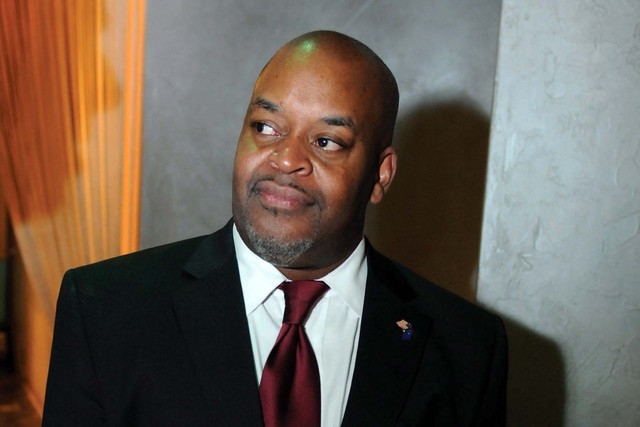Handyman Mike Monroe’s strong show in congressional primary has everyone asking why
The election over, Mike Monroe was hard at work Thursday, fixing a water heater in Las Vegas.
Actually, Monroe never stopped his handyman and construction jobs and never really campaigned much in the highly competitive race for the vast 4th Congressional District covering northern Clark County and six rural counties.
Despite that laissez-faire attitude, Monroe won two counties and swept up 22 percent of the GOP primary vote Tuesday, finishing third behind the winner, Assemblyman Cresent Hardy, R-Mesquite, and Niger Innis, a conservative civil rights activist. Hardy will face incumbent U.S. Rep. Steven Horsford, D-Nev., in the Nov. 4 election.
A stunned Innis, a tea party candidate who thought he had a chance for an upset, can’t believe Monroe did so well. He said he is gathering information to file a complaint with the Nevada secretary of state’s office.
“The mystery of the ages is ‘who is Mike Monroe?’” Innis said as the election returns came in Tuesday night, showing him losing to Hardy and just beating Monroe. “He (Monroe) is siphoning off a lot of votes.”
In a release sent out Thursday afternoon, Innis said an investigation needs to look at the potential of a computer error or “glitch” in the system, although he cited no evidence for such a possibility.
“But I believe until we investigate, until Secretary of State (Ross) Miller investigates, we won’t know the reason for Mr. Monroe getting 22 percent of the vote,” Innis said in the statement. “And believe me, there is a reason out there somewhere. We just have to work together to find it.”
Innis for Congress Campaign Manager Steve Forsythe discounted suggestions that Monroe’s vote total was the result of protest votes.
Forsythe said the campaign will move ahead not because they believe the overall results will be changed, but because there is an obvious flaw in the voting system in Nevada and the 22 percent vote for Mr. Monroe was either the result of a computer error or a loophole in the registration/voting process that was taken advantage of.
Monroe said he can’t explain his strong showing, though he has some name recognition from two previous runs for Congress, in 2006 and 2010. Innis, who moved to Nevada in 2007, isn’t widely known here, Monroe said, while Hardy is better known in Clark County and parts of rural Nevada because his family has been here for generations.
“I get around,” Monroe said, noting he has traveled every county in the district, including Esmeralda and White Pine, where he beat Hardy and Innis. “I’m from Nevada. I’ve been traveling all these counties for years and people know me. I’m a people person. I’m out there with the people. I have a platform. They (Hardy, Innis) don’t have a platform.”
Monroe has a low opinion of Innis as a Nevada candidate.
“Niger Innis is a carpetbagger,” Monroe said. “I was born here. This is my state.”
In 2010, Monroe won only 1.7 percent of the vote in a crowded field of eight candidates vying for the GOP nomination in the 1st Congressional District in urban Las Vegas. In 2006, he got 10.6 percent of the vote in CD1, finishing last in a field of three Republican candidates.
In Tuesday’s primary Monroe won 22.11 percent of the vote, finishing behind Innis at 33.12 percent, and Hardy, who prevailed with 42.63 percent of the vote. A fourth GOP candidate, Carlo Poliak, got 2.14 percent of the vote.
Hardy won Clark County, which accounts for three-quarters of the voters in CD4, and finished first in Lyon County, recording a total of 10,396 votes.
Innis won in Lincoln, Mineral and Nye counties, finishing with 8,076 votes.
Monroe won tiny Esmeralda County and vast White Pine County, for a total of 5,392 votes.
Poliak finished dead last in all seven counties, picking up just 523 votes.
In the congressional races, there’s no “none of these candidates” option on the ballot, so some Monroe votes could have been a protest from Republicans who didn’t like the two main contenders.
The Innis campaign said it has been unable to find any voters who cast ballots for Monroe.
But Tom Grover, an active member of the Nevada Republican Party, said Thursday he voted for Monroe because he didn’t like the fact that Hardy and Innis are “social conservatives” who oppose same-sex marriage. He said he would have voted for “none” if it had been an option.
“I just couldn’t vote for either of them,” Grover said. “They’re old school, 20th century conservatives. … I’m definitely an outspoken supporter for equal rights for gays and lesbians. I think it’s the civil rights issue of our generation.”
Pre-election polls showed Hardy and Innis both had low name recognition, around 30 percent. Early surveys also showed a high number of undecided voters, or far more than half in a primary where just over 19 percent of the Nevada electorate cast ballots.
In a low-turnout, low-information contest, some voters may have randomly ticked off Monroe’s name because “it seems like a normal name,” one GOP operative speculated. Neither Cresent nor Niger sound as normal as Mike. Poliak has run in nearly every election cycle since the 1970s, but this was his first congressional race.
Monroe laughed at how well he did this year, and said he plans to run again, partly for the $174,000 salary.
He said he didn’t have time this year to seriously campaign because he was too busy with work.
“Next time I’m going to put work aside,” Monroe said, anticipating possible victory down the road.
Contact Laura Myers at lmyers@reviewjournal.com or 702-387-2919. Find her on Twitter: @lmyerslvrj.

















